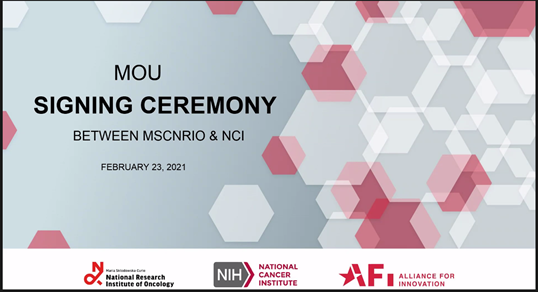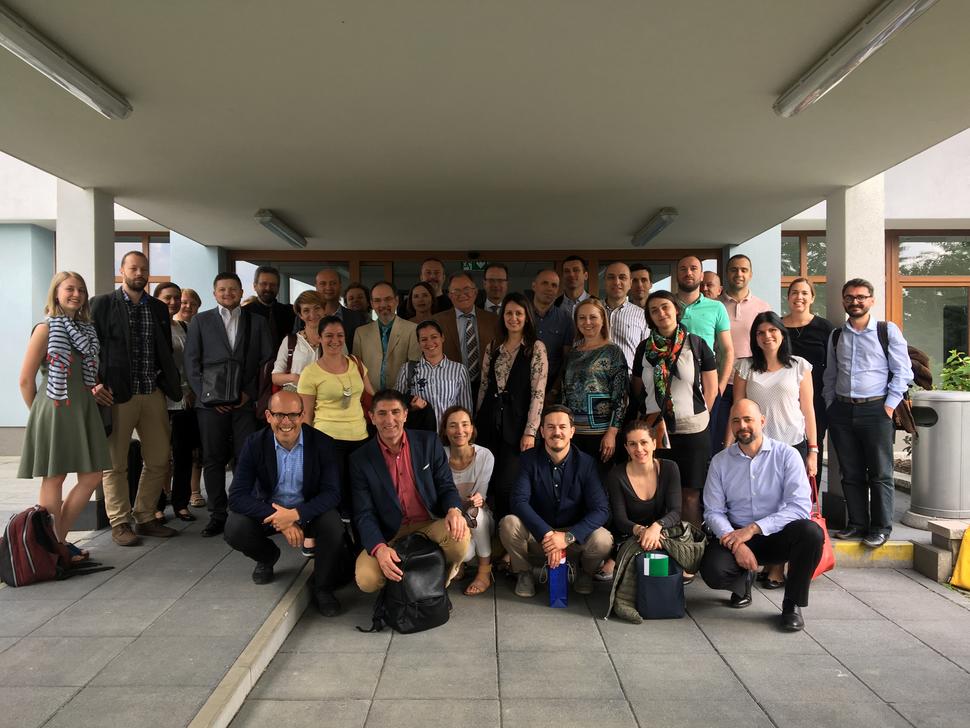Strengthening U.S. – Poland Cooperation in Cancer Research
, by Mark Parascandola, PhD, MPH
This month the National Cancer Institute, (NCI) signed a Memorandum of Understanding with the Maria Skłodowska - Curie National Research Institute of Oncology (MSCNRIO), based in Warsaw, Poland. The memorandum aims to promote cooperation between the two institutions on cancer control research and training.
Both Poland and the United States have made tremendous progress over the past several decades in addressing the burden of cancer through reducing tobacco use and through innovations in cancer control and treatment. For example, both countries have seen a decrease in lung cancer incidence since 2000, particularly among men, due to reductions in cigarette smoking. While cancer remains a leading cause of morbidity and mortality in both countries, collaborative research holds promise to advance efforts against cancer.
In the spring of 2018, I had the opportunity to spend three months in Poland on an Embassy Science Fellowship based at the US Embassy in Warsaw. The primary goal of the fellowship was to provide technical assistance and develop US-Poland scientific collaborations around air pollution and health. I met with a wide variety of experts in health and air quality measurement from government, academia, and industry around Poland. I also contributed to the U.S. Embassy in Warsaw’s public diplomacy efforts by participating in public forums and sharing information about US programs and research related to air pollution and cancer.
Half of my time was spent working on-site at the MSCNRIO, and we initiated some exciting projects. For example, as the MSCNRIO houses the central cancer registry for Poland and has historical data going back several decades, we investigated trends in lung cancer over time in relation to smoking and viewed this in comparison to trends in the U.S. We also collaborated on analyzing data from a survey of public awareness and knowledge about cancer in Poland, enabling comparisons with findings from NCI’s Health Information National Trends Survey (HINTS).
Additionally, NCI and MSCNRIO co-organized two workshops on tobacco control research in 2016 and 2018, bringing together investigators from across Central and Eastern Europe. Participants shared research methods and findings to inform tobacco control efforts in the region, focusing on advancing tobacco cessation in oncology settings and economic analyses of tobacco control interventions and policies. Both workshops were hosted by the Institute of Oncology in Warsaw with support from NCI’s Center for Global Health (CGH).
The fellowship was a fascinating and rewarding experience, enabling me to explore cancer prevention in a new context and to work together with Polish colleagues in addressing common challenges. And I got to know Warsaw, a vibrant, cultural city. The collaborations that began during my fellowship three years ago have continued to grow. Since that time, NCI and MSCNRIO staff have worked together and exchanged visits between Bethesda and Warsaw.
This year we are celebrating the 50th Anniversary of the 1971 U.S. National Cancer Act. One consequence of the Act was the signing of a series of bilateral agreements for cancer research during the 1970s. Indeed, one of the first bilateral agreements NCI signed with a foreign cancer institute (after the USSR and Japan) was with Poland. In 1974 an agreement was signed between the NCI, Poland’s Ministry of Health, and the MSCNRIO, then led by Professor Tadeusz Koszarowsky. Early on, the program supported scientific exchanges, and several Polish scientists spent 3-4 months at U.S. institutions working with colleagues on joint research projects.
Over the years, NCI and other NIH institutes have supported research grants and collaborations on cancer with Polish institutions. For example, NCI epidemiologists worked with Polish colleagues on studies of migrants from Poland to the U.S. to understand the environmental causes of cancer. Additionally, in the 1990s, NCI investigators collaborated on a study to assess occupational and environmental exposures and breast cancer in Poland, working with scientists at the MSCNRIO in Warsaw.
Thus, as CGH Director Dr. Satish Gopal remarked, “the signing of this agreement builds on almost 50 years of collaboration between our two institutions, even as we look forward to progress that the next 50 years will bring.”
The new agreement provides a framework to further develop collaborations in critical areas of cancer research between NCI and MSCNRIO. Cooperation under the MOU will focus on six areas:
- Cancer Prevention - Continuing ongoing collaborations in tobacco control research and cancer prevention.
- Cancer Control Strategies - Exchanging information and experience around cancer control programs on the impact of the COVID-19 pandemic on cancer control.
- MSCNRIO leads the implementation of Poland’s cancer control plan.
- Innovative Advances in Cancer Research - Developing innovative cancer research collaborations.
- Data Management and Sharing - Sharing methods for bioinformatics and data management.
- MSCNRIO hosts Poland’s national cancer registry and has pioneered systems to integrate databases on outcomes for cancer patients.
- New Technologies in Cancer Control - Cooperation and exchange of information around novel technologies for cancer control.
- Education and Training – NCI technical support for the development of a cancer prevention and control curriculum in Poland.
The MSCNRIO is the largest oncology institution in Poland, with a mission to discover new knowledge in oncology and to support Poland’s national comprehensive cancer control plan through prevention, diagnostics, treatment, and education.
The institution has its origins in the former Radium Institute, which was established through the efforts of physicist, chemist, and Nobel laureate Maria Skłodowska-Curie. During the 1920s, she traveled twice to the U.S. to raise funds and support for the new Institute and was presented with a donation from the Polish community in the U.S. in a White House ceremony with President Herbert Hoover.
Last month a ceremony was held to announce the new MOU, with presentations from Dr. Satish Gopal, and Prof. Jan Walewski, Director of the MSCNRIO. The Ministry of Health of the Republic of Poland was represented by the Undersecretary of State, Sławomir Gadomski, who in his speech stressed the importance of strengthening relations between the two countries as well as bolstering the joint effort and cooperation in fighting cancer. The Polish American Alliance for Innovation Foundation helped to organize the event.
As we kick off this renewed collaboration, we are reminded that cancer research anywhere should benefit people everywhere. It is through sustained international partnerships, as that between the U.S. and Poland, that we can maximize the impact of cancer research on peoples’ lives worldwide.

